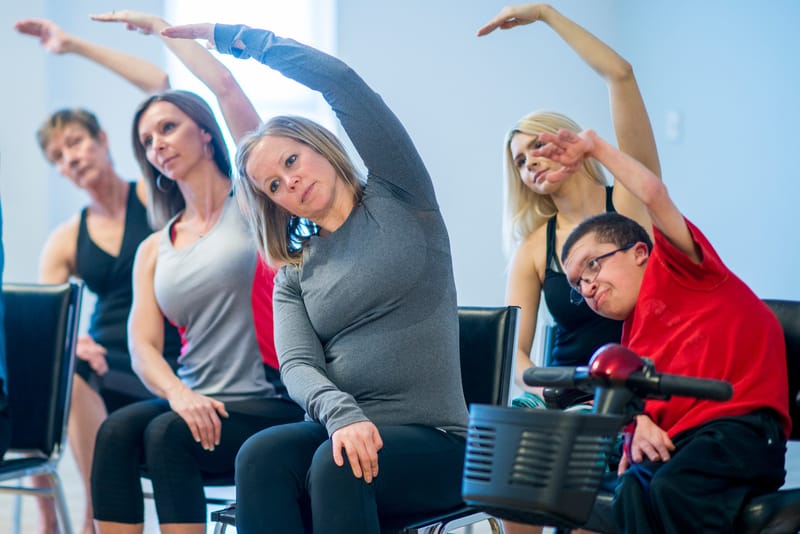Handi Yoga

In the concept of disability, it is not so much the impairment that constitutes the disability as the inability for the affected person to find his or her place in his or her environment.
It is the lack of adaptation in society that marginalizes the disabled person.
This is why we are now talking about people with disabilities.
Disability is multiple and covers a wide variety of situations that do not always make it easy to understand.
Viniyoga adapts to these different forms of disability taking into account the specificity of each disability and how it is experienced and perceived by everyone.
“There is not a yoga for everyone, but a yoga for everyone”.
Viniyoga is a discipline that – and this is in its foundations, because the word “Viniyoga” comes from the term “vi” which means “making appropriate choices” and “ni” which means “within”. - adapts to each person according to his or her intrinsic abilities.
This adaptability of yoga allows disabled people, with very different pathologies, to access this discipline, even when the practitioner is deaf, blind or poorly mobile. It provides a way for people with disabilities to learn about their physical bodies, reconnect with them, appreciate them and release tensions.
In the philosophy of yoga, it is considered that the body and mind constitute only the outer and impermanent envelope of man.
Beyond this form, the deep essence is the same in all beings, and it is whole and perfect.
Whatever the disability, viniyoga always takes into account the person in a holistic way.
Yoga supports the disabled person’s efforts and aims to maintain balance of vital functions.
The practice of yoga for people with disabilities (regardless of disability) contributes to:
- improve the heart rate through breath exercises (pranayama), which allow to learn how to breathe better and manage anxiety. It’s not about breathing mechanically, it’s about consciously connecting to your breath to connect to yourself.
Breathing, the breath clearly allows to lift all emotional or physical blockages that hinder our life balance.
The role of pranayama is also to purify the senses of perception, mind and energy channels (nadis) of the practitioner.
- improve the functioning of the digestive system by stretching and flexing the body to help it remain supple and stimulate the functions of the digestive organs.
- strengthen the immune defenses by practices that boost the circulation of the lymphatic system through muscle activity (stretching, flexions,...) because, in addition to blood circulation, The lymphatic system allows nutrients to circulate throughout the body. It helps the body fight off diseases and become stronger.
- Helps maintain the entire bone structure and joints by sheathing of muscles in several parts of the body to prevent skeletal deformities.
Yoga can allow a better knowledge of the body pattern of the disabled person, to re-engage certain deep muscles that have not been mobilized.
- Allows to regain balance and coordination of movements to regain motor coordination
- works concentration and promotes the development of creativity in yoga postures.
We adapt yoga, starting from the assumption that there are many sensations that are more subtle in the body-mind relationship than those felt in the activation of a muscle.
Subtle sensations are affected by breathing, alignment and posture, as well as the way we move. Reaching this level of consciousness does not restore mobility to the limbs but it helps to feel whole as if one were living in the whole body.
Yoga has many therapeutic benefits. Many benefits to the physical body are recognized and they are also significant for mental health.
Viniyoga offers the possibility of reconnecting with oneself, to regain a better self-esteem, to become aware of everything that hinders us, and blocks us in the evolution of our life path. It awakens the field of possibilities and allows to focus on them.
Yoga brings us back to the state of being, in the present moment, as if we become an ocean of pure consciousness where we strip ourselves of all unnecessary desire to stabilize the mind and make it more flexible.
This helps to maintain a certain physical and mental fitness and avoid complications due to inactivity.
Contact: 0485/891548


